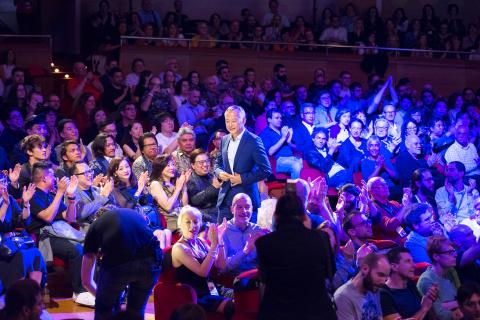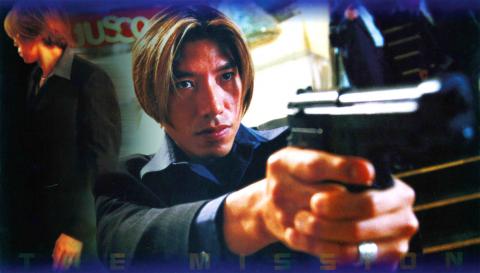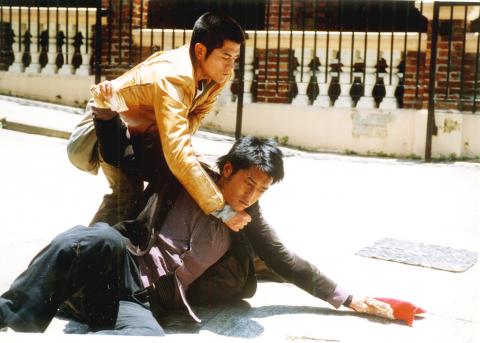The name Johnnie To (杜琪峯) is ubiquitous in Hong Kong cinema, but the prolific director and producer claims he might have never ended up making films, if it wasn’t for a stroke of luck 45 years ago.
As a then broke and unemployed 17-year-old, To joined Hong Kong’s leading television station TVB (Television Broadcasts Limited) on a whim, with no clue that it would eventually lead him to his true calling.
“I really just needed a job and some money. It wasn’t my choice, but I happened to be assigned to the drama department,” he says. “If I had been sent to the engineering department, I might have ultimately become an engineer.”

Photo courtesy of the Far East Film Festival
Today, the 63-year-old godfather of Hong Kong gangster films continues to be one of the most active and commercially successful filmmakers in the local industry, both in terms of quantity and quality. To has made more than 50 films since debuting in 1980, releasing at least two to three films a year without fail under his production company Milkyway Image (銀河映像).
The three-time Golden Horse best director winner has also reaped critical acclaim overseas, with major film festivals including Cannes, Venice and Toronto premiering his works. Last October, the Toronto International Film Festival screened a retrospective on 19 of To’s iconic films, including The Mission (鎗火, 1999) and Election (黑社會, 2005), while the recent Far East Film Festival in Udine, Italy closed their 20th edition with a restored version of his 2004 judo drama, Throw Down (柔道龍虎榜).
“This is one of my favorite movies,” To says. “I made Throw Down at a time when Hong Kong was suffering from the SARS epidemic, and the morale of the people was low. But as the title Throw Down implies, you have to get back up.”

Photo courtesy of the Far East Film Festival
It’s an encouraging message that could likewise be conveyed to Hong Kong’s declining film industry, which now produces around 60 films annually — a far cry from its peak of 400 in the golden era of the early 1990s. Meanwhile, To has diversified by tackling different genres, with films such as romantic drama Linger (蝴蝶飛, 2008) and musical-comedy Office (華麗上班族, 2015).
But he is best known for his gritty, highly-stylized action thrillers that go deep into the dark underbelly of Hong Kong triad society, exploring enduring themes of brotherhood, loyalty and honor.
“The most important thing is to keep your own original ideas and never copy other people’s stuff,” he responds, when probed on his formula for success. “Since the triad genre already exists, I always try to create something different from what has already been shown by injecting my own personality and observations of life, so that people will notice that this is my movie.”

Photos courtesy of the Far East Film Festival
GUT INSTINCT
With his scripts always incomplete at the point of shooting, the auteur, who never studied filmmaking, relies on gut instinct and improvisation on set. He adds: “Every time I look at my lens, I see new ideas pop up; I breathe off all these new energies. That’s why I keep changing my script — to me, that’s the best way to make a movie.”
To, like many other directors, still prefers shooting on film over digital, though he’s not averse to the latest technological trends. For one, he embraces the idea of having more of his films acquired by Netflix — Three (三人行, 2016) and Election are already available for viewing on the global platform.
“I don’t mind my films not being shown on the big screen. The Internet, pay-per-view and streaming are opening up more opportunities for audiences worldwide to see films. As a filmmaker, I’m happy to participate in new platforms that show our works,” he says, adding that it would be nice to see his 2003 crime thriller, PTU, on Netflix.
NURTURING NEW TALENT
Audiences here and all over Asia may have to settle for watching To’s old films online for now — the director remains coy on the details of the anticipated third installment of his hit crime series Election. Having been relatively quiet for the past year, To says he is currently focusing his time on nurturing new talent in the Hong Kong Fresh Wave Short Film Program, which he founded in 2005.
“At that point in time, I felt that I was pretty well-established as a filmmaker. So I wanted to do something to give back to the Hong Kong film industry, like sharing my experiences with new filmmakers,” he says. “It’s my sincere wish that Fresh Wave directors can go out on their own and bring more new works in Hong Kong cinema.”
As for his next projects, To is not content with getting by and doing the bare minimum. “After 45 years, it’s not about the money anymore,” he adds.
“It’s about making a movie that I can feel will really represent myself, and one that will have an impact on future filmmakers. That’s my new goal for the future,” To says.

June 9 to June 15 A photo of two men riding trendy high-wheel Penny-Farthing bicycles past a Qing Dynasty gate aptly captures the essence of Taipei in 1897 — a newly colonized city on the cusp of great change. The Japanese began making significant modifications to the cityscape in 1899, tearing down Qing-era structures, widening boulevards and installing Western-style infrastructure and buildings. The photographer, Minosuke Imamura, only spent a year in Taiwan as a cartographer for the governor-general’s office, but he left behind a treasure trove of 130 images showing life at the onset of Japanese rule, spanning July 1897 to

One of the most important gripes that Taiwanese have about the Democratic Progressive Party (DPP) is that it has failed to deliver concretely on higher wages, housing prices and other bread-and-butter issues. The parallel complaint is that the DPP cares only about glamor issues, such as removing markers of Chinese Nationalist Party (KMT) colonialism by renaming them, or what the KMT codes as “de-Sinification.” Once again, as a critical election looms, the DPP is presenting evidence for that charge. The KMT was quick to jump on the recent proposal of the Ministry of the Interior (MOI) to rename roads that symbolize

On the evening of June 1, Control Yuan Secretary-General Lee Chun-yi (李俊俋) apologized and resigned in disgrace. His crime was instructing his driver to use a Control Yuan vehicle to transport his dog to a pet grooming salon. The Control Yuan is the government branch that investigates, audits and impeaches government officials for, among other things, misuse of government funds, so his misuse of a government vehicle was highly inappropriate. If this story were told to anyone living in the golden era of swaggering gangsters, flashy nouveau riche businessmen, and corrupt “black gold” politics of the 1980s and 1990s, they would have laughed.

In an interview posted online by United Daily News (UDN) on May 26, current Chinese Nationalist Party (KMT) Chairman Eric Chu (朱立倫) was asked about Taichung Mayor Lu Shiow-yen (盧秀燕) replacing him as party chair. Though not yet officially running, by the customs of Taiwan politics, Lu has been signalling she is both running for party chair and to be the party’s 2028 presidential candidate. She told an international media outlet that she was considering a run. She also gave a speech in Keelung on national priorities and foreign affairs. For details, see the May 23 edition of this column,